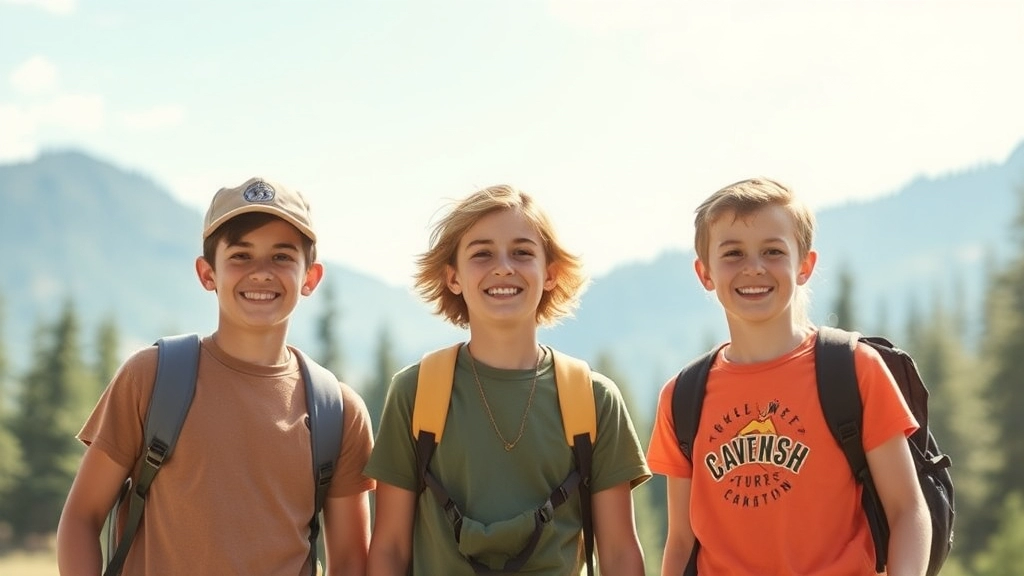Becoming a Top-Notch Summer Camp Leader
Ever wondered what it takes to be a top-notch summer camp leader? From setting the tone and ensuring safety to handling conflicts and fostering a fun environment, the role demands a unique blend of skills and dedication. This guide dives deep into the responsibilities, essential skills, and best practices that make a successful summer camp leader. Whether you’re a seasoned pro or a first-timer, you’ll find valuable insights to elevate your camp leadership game.
What You’ll Explore
We’ll explore everything from training programs and effective communication tips to mentoring counselors and balancing administrative duties with camper engagement. Discover strategies for handling emergencies, building teamwork, and maintaining high morale among staff.
Ready to Enhance Your Skills?
Ready to step up your summer camp leadership skills? Let’s dive in and turn your camp into an unforgettable experience for everyone involved.
Key Responsibilities of a Summer Camp Leader
Ever wondered what it takes to be a summer camp leader? Trust me, it’s not just about roasting marshmallows and singing campfire songs. Let’s dive into the nitty-gritty of what a summer camp leader really does.
Setting the Tone for the Camp
First things first, as a summer camp leader, you set the tone. You’re the one who creates the vibe that makes kids excited to be there. Your energy and attitude can make or break the camp experience. Think of it like this: If you’re pumped, the kids are pumped. Simple as that.
Ensuring Safety and Well-being
Safety is your top priority. You’re like the guardian angel of the camp. Your responsibilities include:
- Conducting regular safety checks
- Ensuring all activities are risk-assessed
- Keeping an eye on campers’ health and well-being
Imagine a camper trips and falls. You need to be swift in administering first aid and calming the situation. This is where your quick thinking and preparedness come into play.
Organising Activities
Planning and organising activities is where your creativity shines. From arts and crafts to sports and adventure activities, you need to keep the schedule packed and varied. Here’s a quick checklist:
- Daily schedules: Plan activities that cater to different interests.
- Special events: Think themed nights or talent shows.
- Backup plans: Always have a Plan B for rainy days or unexpected hiccups.
For inspiration, consider checking out different summer camp themes to keep your activities fresh and exciting.
Leading by Example
You’re not just a leader; you’re a role model. Kids look up to you, so your behaviour sets the standard. Whether it’s showing respect, demonstrating teamwork, or just being enthusiastic, your actions speak louder than words.
Managing Staff and Volunteers
You’re also the go-to person for your team. This means:
- Delegating tasks: Ensure everyone knows their roles.
- Providing support: Be there to help when staff face challenges.
- Offering feedback: Constructive criticism helps everyone grow.
For those looking to improve their leadership skills, consider exploring resume tips and tricks for camp counselors.
Handling Conflicts and Emergencies
Conflicts and emergencies are inevitable. Maybe two campers are arguing, or someone gets hurt. Your job is to handle these situations calmly and efficiently. Tips for handling conflicts include:
- Listening: Hear both sides before making a decision.
- Mediation: Help find a middle ground.
- Action: Take swift action to resolve the issue.
Documentation and Reporting
Finally, there’s the paperwork. It’s not the most glamorous part, but it’s crucial. You’ll need to:
Essential Skills and Qualifications for Camp Leadership
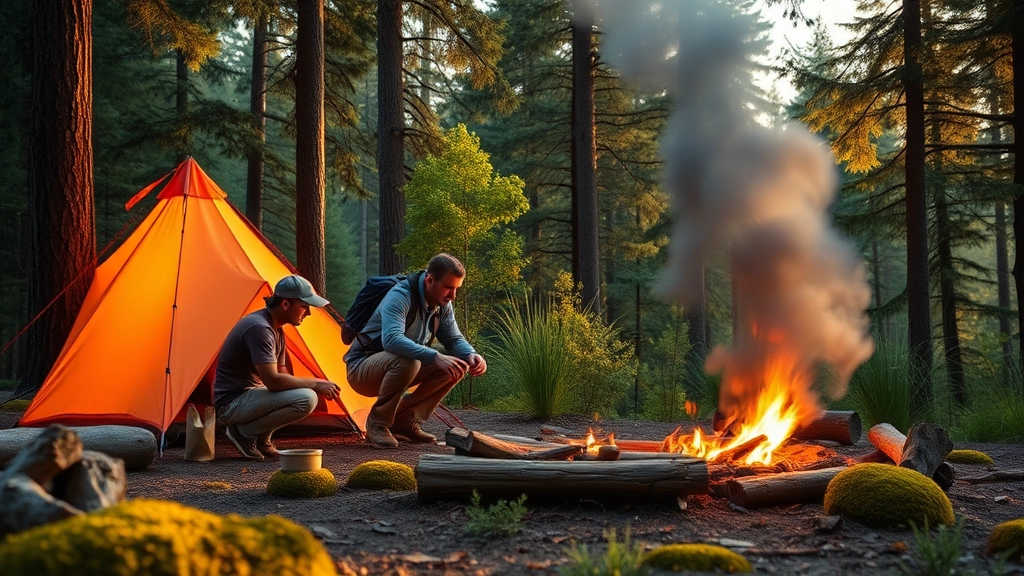
Ever wondered what makes a top-notch summer camp leader? Let’s dive in.
Key Skills You Need
- Communication: You’ve got to be a talker and a listener. Clear, concise, and engaging.
- Organisation: Juggling schedules, activities, and camper needs is no joke.
- Problem-Solving: Quick thinking is a must. Can you handle a sudden downpour or a homesick camper?
- Leadership: Leading by example. You’re the role model here.
- Adaptability: Camps are unpredictable. Flexibility is your best friend.
Qualifications to Have
- First Aid Certification: Safety first, always.
- Background Checks: Essential for working with kids.
- Relevant Experience: Previous camp roles, teaching, or coaching.
- Specialised Skills: Swimming, hiking, arts and crafts—whatever your camp offers.
Real Talk: Stories and Examples
I remember my first year as a camp leader. A kid got stung by a bee, and I had to stay calm, administer first aid, and comfort him—all while keeping the rest of the group entertained. That’s where those skills come into play.
Training Programs
Look for programs that offer:
- Hands-On Training: Real scenarios, real solutions.
- Leadership Workshops: Learn from the best.
- Emergency Preparedness: You can never be too ready.
Check out our section on Training Programs for Aspiring Camp Leaders for more details on where to get these skills.
Training Programs for Aspiring Camp Leaders
So, you’re thinking about stepping up as a summer camp leader, huh? Awesome choice! But I bet you’re wondering, “Where do I even start?” or “Do I need some special training?” Well, let’s dive into it.
Why Training Programs Matter
First off, training programs for aspiring camp leaders are like your secret weapon. They equip you with the skills, knowledge, and confidence to handle anything camp life throws at you. Trust me, you don’t want to wing this.
Types of Training Programs
There are different routes you can take to get trained up, and it’s all about finding what fits you best. Here are some options:
- Certified Courses: These are usually offered by organisations like the American Camp Association (ACA) or the UK’s National Outdoor Education Centres. They cover everything from safety protocols to leadership skills.
- Workshops and Seminars: Shorter but still packed with valuable info. These can be a great way to get quick, actionable tips.
- Online Training: Perfect if you’re juggling other commitments. Websites like Coursera or even YouTube have resources that can help you get started.
What You’ll Learn
Now, what do these programs actually teach you? Here’s a breakdown:
- Safety Procedures: How to handle emergencies, first aid, and keeping everyone safe.
- Leadership Skills: Motivating your team, conflict resolution, and effective communication.
- Activity Planning: How to design engaging and educational activities.
- Camper Psychology: Understanding the needs and behaviours of kids.
Real Talk: My Experience
When I first started, I took a weekend workshop. It was intense but worth it. I learned how to handle a rowdy group of kids without losing my cool and picked up some killer tips on planning activities that everyone loves. Plus, I met other aspiring leaders, which was a bonus.
Internal Linking Opportunity
If you’re curious about what specific skills you’ll need, check out our section on Ultimate Guide to Summer Camp Icons and Themes. It’s packed with insights that’ll give you a head start.
Key Takeaways
- Invest in Training: It’s not just about ticking a box; it’s about being the best leader you can be.
- Multiple Options: Choose what fits your schedule and learning style.
- Comprehensive Learning: From safety to psychology, these programs cover it all.
For more tips on making the most out of your camp experience, don’t miss our article on Summer Camp Field Trips: Top Tips and Destinations.
Best Practices for Supervising Campers
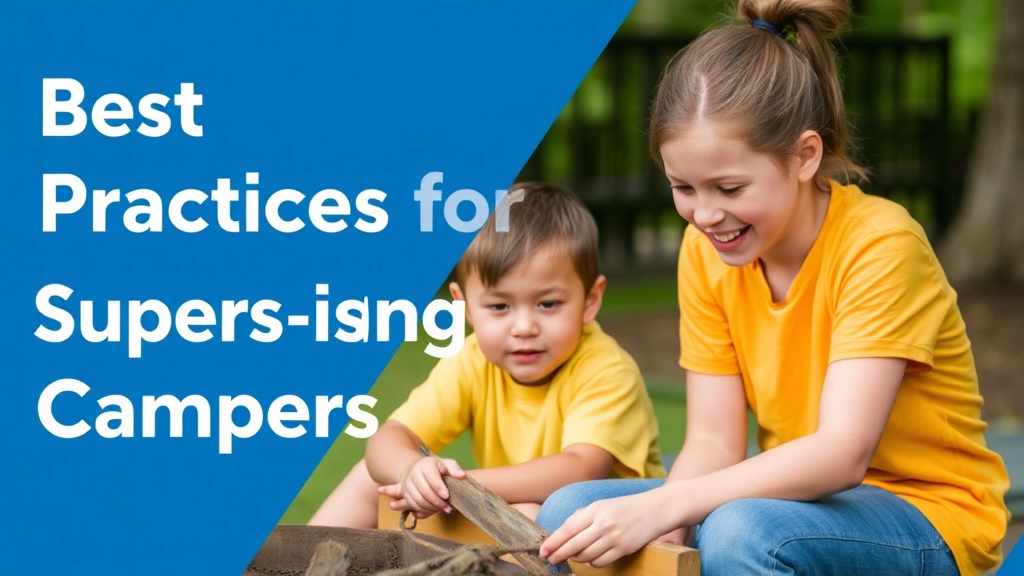
Alright, let’s talk about supervising campers.
It’s not just about keeping an eye on them. It’s about engaging with them, ensuring they’re safe, and making sure they have a blast.
How do you do that?
Here are some best practices:
1. Know Your Campers
- Get to know each camper’s name.
- Understand their interests and quirks.
- This isn’t just about being friendly; it helps you spot when something’s off.
2. Set Clear Expectations
- Lay down the rules from day one.
- Make sure everyone knows what’s expected of them.
- Clear rules = fewer misunderstandings.
3. Be Present
- Always be where the action is.
- Being present means being available.
- Campers should feel they can come to you anytime.
4. Safety First
- Always keep an eye out for hazards.
- Regularly check the equipment and facilities.
- Have a first aid kit handy and know how to use it.
5. Encourage Participation
- Get everyone involved in activities.
- No one should feel left out.
- It’s all about creating a sense of belonging.
6. Be a Role Model
- Lead by example.
- Show respect, enthusiasm, and responsibility.
- Campers will follow your lead.
7. Daily Check-ins
- Have short, daily meetings with your campers.
- Discuss the day’s activities and any concerns.
- This keeps everyone on the same page.
8. Handle Issues Promptly
- Don’t let small issues fester.
- Address problems as soon as they arise.
- Quick action prevents bigger problems down the line.
9. Build a Rapport
- Share stories and experiences.
- Let campers see you’re human too.
- A good rapport builds trust and makes supervision easier.
10. Stay Positive
- Keep the energy up.
- A positive attitude is infectious.
- Even when things go wrong, a positive outlook can turn it around.
Real Talk
Remember that time when a camper was homesick? I sat with them, shared my own camp stories, and soon they were laughing and joining in.
It’s moments like these that make all the difference.
Strategies for Handling Conflict and Emergencies
Ever had a camper meltdown or a sudden medical issue that left you scratching your head? Handling conflict and emergencies at summer camp is no walk in the park, but with the right strategies, you can tackle these challenges head-on. Let’s dive into some practical tips that can save the day when things go sideways.
Conflict Resolution: Keeping the Peace
Conflict is inevitable when you have a bunch of kids in one place. Here’s how to keep things from blowing up:
- Stay Calm and Collected: Your reaction sets the tone. Keep your cool, and the kids will follow suit.
- Listen Actively: Sometimes, kids just need to be heard. Let them vent before jumping to conclusions.
- Mediation Techniques: Act as a neutral party. Encourage campers to express their feelings and find a compromise.
- Set Clear Rules: Make sure everyone knows the camp’s code of conduct. Consistency is key.
- Follow Up: Check in with the kids involved to ensure the issue is truly resolved.
Emergency Preparedness: Ready for Anything
Emergencies can and do happen. Here’s how to be ready:
- First Aid Training: This is non-negotiable. Make sure you and your staff are certified.
- Emergency Drills: Regular drills for fire, severe weather, and other scenarios keep everyone on their toes.
- Communication Plan: Have a clear chain of command and ensure everyone knows who to contact.
- Emergency Kit: Stock it with essentials like bandages, antiseptics, and any specific medications needed.
- Know Your Campers: Be aware of any medical conditions or allergies. Keep this info handy but confidential.
Real-Life Examples: Learning from Experience
Let me share a story. One summer, we had a camper who was severely allergic to bee stings. Despite our precautions, she got stung. Thanks to our training and having an EpiPen on hand, we managed the situation smoothly. The key takeaway? Preparation and quick action can make all the difference.
Proactive Measures: Preventing Issues Before They Arise
- Clear Communication: Keep lines open between you, your staff, and the campers. Misunderstandings often lead to conflicts.
- Routine Checks: Regularly inspect the campgrounds for potential hazards.
- Engage Campers: Boredom can lead to trouble. Keep activities engaging and varied.
Balancing Conflict and Fun
No one wants to spend their summer dealing with drama. By handling conflicts and emergencies effectively, you can maintain a positive atmosphere and ensure everyone has a blast. Remember, your role as a camp leader is to create a safe and fun environment where kids can thrive.
For more tips on creating an unforgettable camp experience, check out our guide on summer camp week themes and our comprehensive summer camp packing checklist.
The Role of Teamwork in Successful Camp Leadership
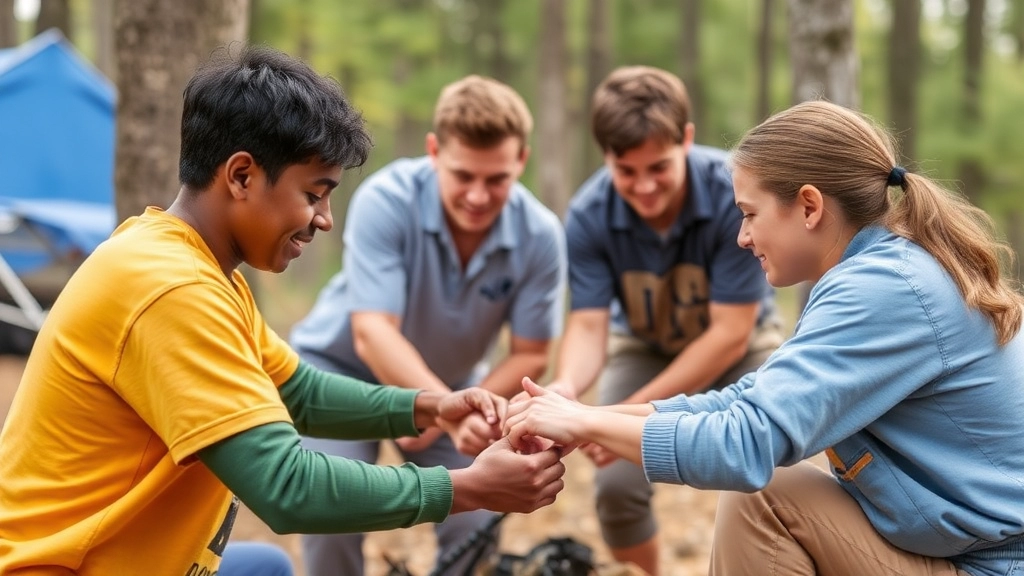
Ever wondered how teamwork can make or break a summer camp?
Let’s be real. Leading a summer camp isn’t a solo gig.
You need a solid team to back you up.
Why?
Because when everyone’s in sync, magic happens.
Why Teamwork Matters
First off, teamwork is the backbone of any successful camp.
Without it, you’re just a bunch of individuals running around.
Here’s why it’s crucial:
- Shared Responsibilities: No one can do it all. Dividing tasks ensures everything gets done.
- Support System: When things go south, your team has your back.
- Diverse Skills: Everyone brings something unique to the table. Use it.
Building a Strong Team
So, how do you build this dream team?
It’s not just about hiring the best people. It’s about creating chemistry.
Here’s how:
- Clear Roles: Everyone should know what they’re responsible for.
- Open Communication: Keep the channels open. No one should feel left out.
- Regular Meetings: Touch base often. It keeps everyone aligned.
Real Talk: Examples
Let me tell you about a time when teamwork saved the day.
We had a camper who got lost during a hike. Panic mode, right?
But because we had a solid team, we handled it like pros.
- One person stayed with the group.
- Another went to find help.
- I coordinated with the camp director.
We found the camper in no time.
That’s the power of teamwork.
Best Practices for Teamwork
Want to keep your team on point? Follow these tips:
- Trust: Trust your team to do their job.
- Feedback: Give and receive feedback. It’s how you grow.
- Celebrate Wins: Even small victories deserve a high-five.
Related Content
- Effective Communication Tips for Camp Leaders
- How to Foster a Safe and Fun Environment at Camp
- Strategies for Handling Conflict and Emergencies
How to Foster a Safe and Fun Environment at Camp
Ever wondered how to make summer camp a blast while keeping everyone safe? It’s a big job, but with the right approach, it’s totally doable. Let’s break it down.
Why Safety and Fun Matter
Safety and fun are the two pillars of a great camp experience. Without safety, parents will worry, and without fun, kids won’t want to come back. So, how do we balance both?
Setting the Stage for Safety
Safety starts with preparation. Here’s what you need to do:
- Conduct Risk Assessments: Identify potential hazards and plan how to mitigate them.
- First Aid Training: Ensure all staff are trained in basic first aid and CPR.
- Emergency Plans: Have clear, practiced plans for emergencies like fires, severe weather, or medical issues.
- Regular Inspections: Check equipment and facilities regularly to ensure everything is in working order.
Making Fun a Priority
Now, let’s talk about fun. Kids come to camp to have a good time, so let’s deliver:
- Engaging Activities: Plan a variety of activities to keep everyone entertained. Think arts and crafts, sports, nature walks, and talent shows.
- Encourage Participation: Get everyone involved. The more, the merrier!
- Positive Atmosphere: Foster a positive, inclusive environment where kids feel comfortable trying new things.
Combining Safety and Fun
How do you make sure safety doesn’t kill the fun? Here are some tips:
- Supervision: Always have enough staff to keep an eye on the kids. This helps prevent accidents and ensures everyone is having a good time.
- Clear Rules: Set and communicate clear rules. Make sure kids know what’s expected of them and the consequences of breaking the rules.
- Lead by Example: Show kids how to have fun safely. If you’re enthusiastic and responsible, they’ll follow your lead.
Real-Life Example: The Water Balloon Fight
Let’s say you’re planning a water balloon fight. Sounds fun, right? But it can also be risky. Here’s how to balance both:
- Safety First: Make sure the playing area is free of hazards like sharp objects or slippery surfaces.
- Set Rules: Explain the rules clearly before starting. No throwing balloons at faces, for example.
- Supervise: Have staff members spread out to supervise and step in if things get too rough.
- Have Fun: Join in! Show the kids how much fun it can be while following the rules.
For more ideas on keeping camp fun and safe, check out our Top Summer Camp Field Trip Ideas for 2024 and learn about Designing Durable and Visible Summer Camp Arrow Signs.
Balancing Administrative Duties with Camper Engagement
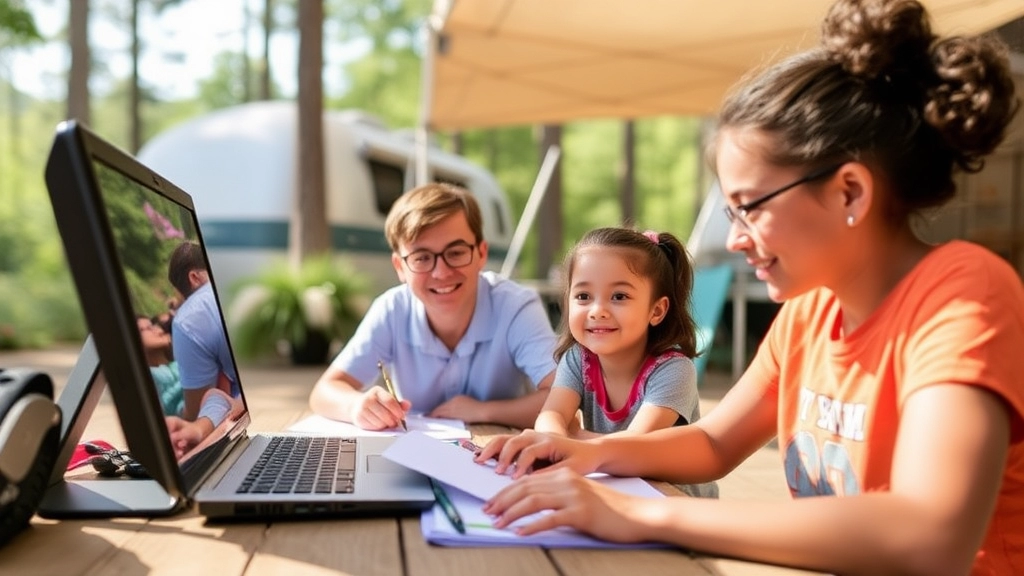
How do you juggle paperwork and still have fun with campers?
It’s a real challenge, isn’t it? You want to be that awesome camp leader who’s both organised and present with the kids. But how do you pull it off?
Let’s dive in.
Prioritise Your Tasks
First things first, get your priorities straight.
- Urgent vs Important: Know what needs immediate attention and what can wait.
- Daily To-Do List: Jot down your tasks every morning.
Delegate Like a Pro
You don’t have to do everything yourself.
- Trust Your Team: Hand over some duties to trusted staff.
- Clear Instructions: Make sure they know exactly what to do.
Time Blocking
Block out chunks of time for different tasks.
- Admin Time: Set aside specific hours for paperwork.
- Camper Time: Dedicate blocks for engaging with campers.
Use Tech to Your Advantage
Tech can be your best mate here.
- Scheduling Apps: Use apps to keep track of tasks.
- Automate What You Can: Automate repetitive tasks like emails.
Stay Flexible
Things will pop up. Be ready to adapt.
- Quick Shifts: Be prepared to switch from admin to camper mode quickly.
- Backup Plans: Always have a Plan B.
Personal Story Time
I remember my first year as a camp leader. I was drowning in paperwork and barely had time for the kids. Then I started using a simple to-do list and delegating tasks. It changed everything. I was more present, and the campers noticed. They felt more connected and engaged.
Engage During Admin Tasks
Yes, it’s possible.
- Open Door Policy: Let campers know they can pop in while you’re working.
- Interactive Admin: Do some tasks outside where campers are. They’ll feel your presence.
Keep It Fun
Remember, camp is about fun.
- Mini Breaks: Take short breaks to join in on activities.
- Be Present: Even during admin time, keep an ear out for what’s happening around you.
Effective Communication Tips for Camp Leaders
Ever wondered how to keep campers engaged and staff motivated? Communication is key, my friend. Let’s dive into some practical tips to sharpen those skills.
Why Communication Matters
Communication isn’t just about talkingâit’s about connecting. As a camp leader, you need to ensure everyone is on the same page. Misunderstandings? Not on our watch. For more insights, explore our FSA tips for summer camp savings.
Top Tips for Effective Communication
1. Be Clear and Concise
Nobody likes a ramble. Get to the point. Here’s how:
- Use simple language: Skip the jargon.
- Be direct: Say what you mean.
- Check understanding: Ask for feedback to ensure clarity.
2. Listen Actively
Listening is half the battle. Show you’re engaged:
- Maintain eye contact: It shows you’re present.
- Nod and respond: Validate their input.
- Repeat back: Confirm you’ve understood correctly.
3. Use Non-Verbal Cues
Sometimes, actions speak louder than words:
- Smile: It’s inviting.
- Open posture: Be approachable.
- Gestures: Use them to emphasise points.
4. Tailor Your Approach
Everyone’s different. Adapt your style:
- For kids: Be animated and fun.
- For teens: Be relatable and genuine.
- For staff: Be professional yet approachable.
Real-Life Example
Let’s say you’re explaining a new activity. Instead of a long-winded speech, use bullet points:
- What it is: Describe the activity.
- Why it’s fun: Sell the excitement.
- Safety tips: Keep it safe and sound.
Handling Difficult Conversations
Conflict and emergencies happen. Here’s how to tackle them:
- Stay calm: Keep your cool.
- Acknowledge feelings: Show empathy.
- Find solutions: Focus on resolving the issue. Learn more about summer camp licensing requirements.
Building a Communication-Friendly Environment
Create a space where everyone feels heard:
- Open-door policy: Encourage questions.
- Regular check-ins: Keep the dialogue going.
- Feedback loops: Use feedback for growth.
Mentoring and Supporting Counselors: A Leader’s Role

Ever wondered how to be the backbone of your camp team?
As a summer camp leader, mentoring and supporting counselors is a big part of the gig.
Let’s break it down.
Why Mentoring Matters
Counselors look up to you for guidance. They need someone who’s been there, done that.
- Experience Sharing: Share your wins and losses. They’ll learn quicker from your stories than any manual.
- Skill Development: Help them sharpen their skills. Whether it’s conflict resolution or activity planning, be their go-to resource.
Building a Strong Support System
Your counselors need to feel supported. Here’s how you can make that happen:
- Open Communication: Keep the lines open. Make it easy for them to approach you with any issue.
- Regular Check-ins: Weekly one-on-ones can work wonders. Use this time to address concerns and provide feedback.
- Encouragement: A little praise goes a long way. Recognise their efforts and achievements regularly.
Handling the Tough Stuff
Not everything is sunshine and rainbows. Sometimes, you’ve got to deal with the hard stuff.
- Conflict Resolution: Teach them how to handle disputes among campers and within the team. Lead by example.
- Stress Management: Camps can be stressful. Show them techniques to stay calm and focused.
- Emergency Preparedness: Make sure they know the drill for emergencies. Run mock scenarios if needed.
Real Talk
Imagine this: One of your counselors is struggling with a homesick camper. They’ve tried everything but nothing’s working.
What do you do?
- Listen First: Sometimes, they just need to vent. Be a good listener.
- Offer Solutions: Share what’s worked for you in the past. Maybe a special activity or a one-on-one chat with the camper.
- Follow Up: Don’t just leave it at that. Check back to see how things are going.
Creating a Positive Environment
A happy team is a productive team. Here’s how you keep morale high:
- Team Activities: Organise fun activities just for the counselors. It builds camaraderie.
- Feedback Loop: Encourage them to give you feedback too. It’s a two-way street.
- Growth Opportunities: Offer chances for them to take on more responsibilities. It keeps them motivated.
How to Maintain High Morale Among Camp Staff
Ever wondered why some summer camps have staff who are always buzzing with energy and enthusiasm? Picture this: It’s the middle of the summer, the sun is blazing, and the campers are running wild. The last thing you need is a team that’s dragging their feet. So, how do you keep the morale high among your camp staff? Let’s dive into it.
Understand Their Needs
First off, listen to your staff. What are their concerns? What do they need to feel supported? Sometimes, it’s as simple as offering a listening ear or a quick chat to make them feel valued.
- Regular Check-ins: Set aside time for one-on-one meetings.
- Anonymous Feedback: Use surveys to gather honest opinions.
- Open Door Policy: Encourage staff to come to you with issues anytime.
Recognise and Reward
Who doesn’t love a bit of recognition? Acknowledging hard work can go a long way in boosting morale.
- Shout-outs: Publicly praise staff during meetings.
- Incentives: Small rewards like gift cards or extra time off.
- Staff of the Week: Highlight exceptional contributions.
Foster a Positive Environment
Creating a positive atmosphere isn’t just about keeping things light and fun. It’s about building a culture where everyone feels included and respected.
- Team-building Activities: Organise games and challenges.
- Inclusive Culture: Celebrate diversity and encourage inclusivity.
- Conflict Resolution: Address issues promptly and fairly.
Provide Growth Opportunities
No one wants to feel stagnant, right? Offer opportunities for professional development to keep your staff motivated and engaged.
- Workshops: Bring in experts to teach new skills.
- Leadership Roles: Allow staff to take on more responsibilities.
- Mentorship Programs: Pair experienced leaders with newer staff.
Keep Communication Clear and Open
Effective communication is the backbone of a well-functioning camp. Ensure everyone is on the same page and feels comfortable voicing their thoughts.
- Regular Meetings: Keep everyone updated on camp activities.
- Clear Instructions: Make sure tasks and expectations are well-defined.
- Feedback Loops: Encourage continuous feedback from both sides.
Share the Vision
Remind your team why they’re here. Share stories of how their work impacts campers’ lives. A sense of purpose can be a powerful motivator.
- Success Stories: Highlight positive camper experiences.
- Mission Statements: Reiterate the camp’s goals and values.
- Future Goals: Discuss plans and visions for the camp’s future.
Lead by Example
As a camp leader, your attitude sets the tone for the entire team. Model the behaviour you want to see in your staff.
- Stay Positive: Keep a positive attitude, even during tough times.
- Be Approachable: Make yourself available and approachable.
- Show Empathy: Understand and share the feelings of your staff.
Practical Tips for Daily Boosts
Sometimes, it’s the little things that make a big difference. Here are some quick wins to keep the morale up daily:
Tips for First-Time Summer Camp Leaders
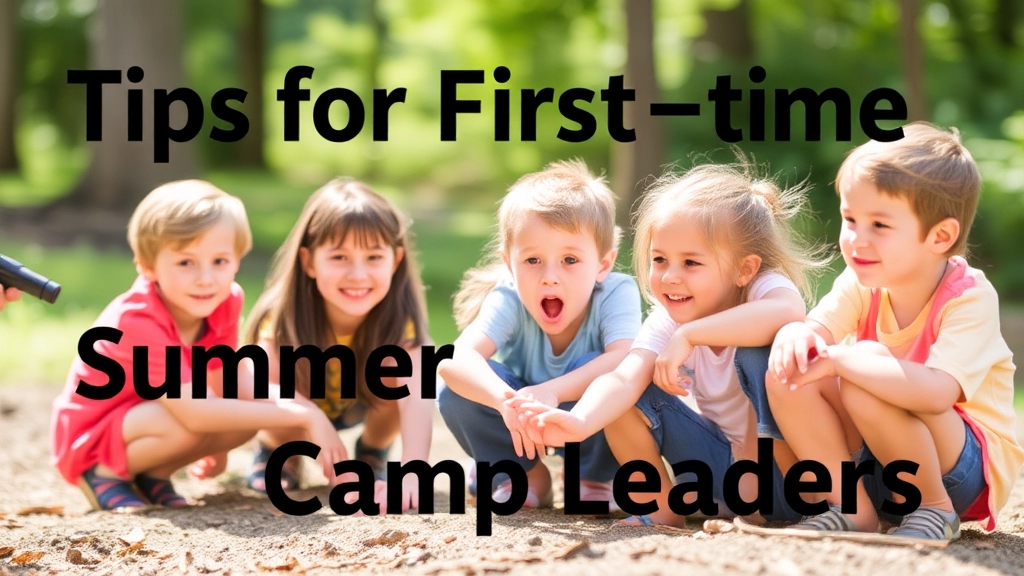
Feeling Nervous as a First-Time Camp Leader?
You’re not alone.
Everyone’s got those first-day jitters.
So, how do you crush it as a first-time summer camp leader?
Let’s dive in.
Know Your Camp Inside Out
Get the lay of the land.
- Familiarise yourself with the camp layout: Know where everything is—cabins, dining hall, activity areas, and emergency exits.
- Understand camp rules and policies: This isn’t just about following the rules; it’s about setting an example.
Build Strong Relationships
Your team is your lifeline.
- Get to know your fellow leaders and counsellors: Strong relationships make for a smooth camp experience.
- Engage with campers from day one: Learn their names, interests, and quirks.
Be Prepared for Anything
Expect the unexpected.
- Carry a small first-aid kit: Cuts and scrapes happen.
- Have a backup plan for activities: Weather can be unpredictable.
Keep Communication Open
Talk, listen, repeat.
- Hold regular check-ins with your team: Keep everyone on the same page.
- Be approachable for campers: They should feel comfortable coming to you with issues.
Adapting to Different Camp Settings and Cultures
Ever worried about how to adapt to different camp settings and cultures? You’re not alone. Many summer camp leaders face the same challenge, and it’s a biggie. Let’s dive into how you can tackle this head-on and come out on top.
Why Adaptability Matters
First off, adaptability is key. Camps come in all shapes and sizes, from rustic nature camps to high-tech adventure camps. Each has its own vibe, rules, and culture. If you can’t adapt, you’re setting yourself up for a rough ride.
Know Before You Go
Before you even step foot on campgrounds, do your homework:
- Research the Camp: Know its history, values, and mission. A camp focused on environmental education will operate differently from a sports camp.
- Understand the Demographics: Who are the campers? What are their backgrounds? Knowing this helps you tailor your approach.
- Talk to Past Leaders: Get insights from those who’ve been there. They can offer invaluable tips and tricks.
On-Site Adaptation
Once you’re on-site, it’s game time. Here’s how to adapt quickly:
- Observe and Listen: Spend the first few days observing and listening. Note how things are done and what the unspoken rules are.
- Ask Questions: Don’t be afraid to ask questions. It shows you’re invested in understanding the camp’s culture.
- Be Flexible: Plans will change. Activities will get rained out. Be ready to pivot and keep the energy positive.
Embrace the Culture
Every camp has its own unique culture. Embrace it:
- Participate in Traditions: Whether it’s a campfire song or a morning ritual, dive in headfirst. It shows you’re part of the team.
- Respect Differences: Camps can have diverse cultures. Respect and celebrate these differences. It’s a learning opportunity for everyone.
- Be Authentic: While it’s important to adapt, don’t lose yourself. Be genuine in your interactions.
Real-World Example
Let me share a story. I once led a camp in the mountains, a far cry from the beachside camps I was used to. The first day, I felt out of place. But I started asking questions, participating in local traditions, and soon, I was leading mountain hikes like a pro. The key was being open to change and embracing the unique aspects of that camp.
Utilizing Feedback for Personal Growth in Leadership

Ever been in a situation where you thought, “What am I doing wrong?” or “How can I be better?”
Feedback is your golden ticket.
Why Feedback Matters
Feedback is like a mirror. It shows you what you can’t see.
And trust me, every camp leader needs that mirror.
How to Embrace Feedback
- Stay Open-Minded: Don’t take it personally. Easier said than done, right? But it’s crucial.
- Ask for It: Don’t wait for feedback to come to you. Seek it out.
- Act on It: What’s the point of feedback if you don’t use it?
Real-Life Example
I remember my first summer as a camp leader. I thought I was smashing it. Then a fellow leader pulled me aside and said, “You’re great with the kids, but your organisational skills need work.”
Ouch.
But guess what? I took a step back, reorganised my approach, and the rest of the summer ran smoother than a hot knife through butter.
Breaking Down Feedback
Here’s a quick guide to make feedback work for you:
- Listen Actively: Don’t interrupt. Absorb it.
- Clarify: If something’s unclear, ask questions.
- Reflect: Take a moment to think about the feedback.
- Plan: Create an action plan to improve.
- Follow Up: Check back in to see if you’re making progress.
Feedback from Campers
Yes, even the kids can give you valuable insights. They’re brutally honest.
Ask them what they liked, what they didn’t, and what they wish was different.
Feedback from Peers
Your fellow leaders are in the trenches with you. They see things you don’t.
Their feedback is gold.
Feedback from Supervisors
They’ve been where you are. They know the ropes.
Their advice can be a game-changer.
Utilising Feedback for Career Growth
Want to move from camp leader to camp director?
Start by mastering feedback.
It’s your roadmap to improvement and success.
Career Progression: From Camp Leader to Camp Director
Ever wondered how to climb the ladder from a summer camp leader to a camp director?
I’ve got you covered.
What’s the Path Like?
First off, it’s not a straight shot.
Think of it like a winding trail in the woods.
You need skills, experience, and a bit of luck.
Here’s how you can make it happen:
1. Master the Basics
Before you can run the show, you need to know the show.
Key responsibilities as a camp leader:
- Supervising campers
- Planning activities
- Ensuring safety
Nail these, and you’re off to a good start.
2. Build Essential Skills
You can’t just wing it.
Develop these core skills:
- Leadership
- Communication
- Problem-solving
These will set you apart.
3. Get Certified
Training programs are your best friend.
Look for:
- First aid certifications
- Leadership courses
- Child psychology workshops
4. Gain Experience
Experience is golden.
Work at different camps, like the ones listed in our Top Summer Camps in Columbia, South Carolina guide.
Learn different cultures and settings.
5. Network Like Crazy
Connections matter.
Attend camp conferences.
Join professional camp associations.
6. Seek Feedback
Ask for feedback from:
- Campers
- Fellow leaders
- Directors
Use it to grow.
7. Show Initiative
Don’t wait for opportunities.
Create them.
Propose new programs.
Volunteer for extra duties.
Real Talk: Stories from the Field
I remember my first gig as a camp leader.
I was nervous.
But I took every chance to learn.
I asked questions.
I made mistakes.
And I grew.
The Final Push: From Leader to Director
When you’re ready, go for it.
Prove you’re ready by:
- Showcasing your experience
- Demonstrating your skills
- Highlighting your initiative
If you’re looking for more tips on how to excel in your camp career, check out our Top Interview Questions for Camp Counselors article.
FAQs on Becoming a Successful Summer Camp Leader
What are the essential skills needed to be a summer camp leader?
To excel as a summer camp leader, you need strong communication, organisation, problem-solving, leadership, and adaptability skills. These skills help you manage schedules, engage with campers, and handle unexpected situations effectively.
What qualifications should I have to become a summer camp leader?
Key qualifications include First Aid Certification, passing background checks, having relevant experience in roles like teaching or coaching, and possessing specialised skills such as swimming or arts and crafts.
How can I effectively supervise campers?
Effective supervision involves knowing your campers, setting clear expectations, being present, prioritising safety, encouraging participation, being a role model, conducting daily check-ins, handling issues promptly, building rapport, and maintaining a positive attitude.
Why is teamwork important in camp leadership?
Teamwork is crucial because it allows for shared responsibilities, provides a support system, and leverages diverse skills. A cohesive team ensures that all tasks are managed efficiently and that support is available when needed.
How can I balance administrative duties with camper engagement?
Balancing these duties involves prioritising tasks, delegating responsibilities, using time blocking, leveraging technology, staying flexible, and engaging with campers even during admin tasks. Strategies like keeping an open door policy and taking mini breaks to join activities can help.
What are some tips for mentoring and supporting counselors?
Effective mentoring includes sharing experiences, helping with skill development, maintaining open communication, conducting regular check-ins, providing encouragement, and handling conflicts and stress management. Creating a positive environment through team activities and growth opportunities is also key.
What should I know as a first-time summer camp leader?
First-time leaders should familiarise themselves with the camp layout and rules, build strong relationships with fellow leaders and campers, be prepared for unexpected situations, and keep communication open. Regular check-ins and being approachable are essential.
How can I use feedback for personal growth in leadership?
Embrace feedback by staying open-minded, actively seeking it, and acting on it. Feedback from campers, peers, and supervisors can offer valuable insights. Use feedback to reflect, plan, and follow up on your progress, which is crucial for career growth.
Are there training programs for aspiring camp leaders?
Yes, look for programs offering hands-on training, leadership workshops, and emergency preparedness. These programs provide real scenarios and solutions, helping you develop essential skills for camp leadership.
References
-
What Makes a Great Camp Leader?
-
Tips for Camp Counselors
-
10 Tips for Camp Counselors

